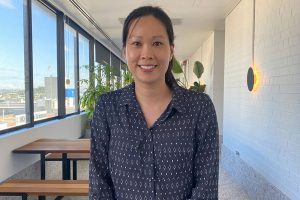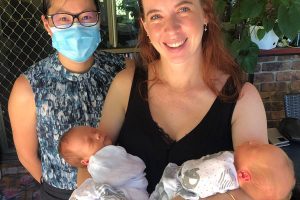The sound of a successful breastfeeding journey

Researcher Thuy Frakking with new mum Katie and twins Eamon and Auley.
For first-time mum Katie, listening to her twins Eamon and Auley was the sweetest sound of all.
Her breastfeeding journey started well but Katie wondered if her feeding was on the right track for the twins who were born prematurely at 35 weeks gestation.
“I was very curious because there was so much discussion about feeding,” Katie said.
“Particularly because one of our twins was a little bit smaller, there was a lot of pressure – he’s got to be feeding well, he’s got to be putting on weight, feed ratings and much more.”
Participating in the Swallowing Sounds in Premature Babies (SUPERB) study, a multi-centre trial in special care nurseries across Caboolture Hospital, Royal Brisbane and Women’s Hospital (RBWH), and Gold Coast University Hospital, gave Katie the confidence she needed to continue on her breastfeeding journey.
The SUPERB study records swallowing sounds from premature babies with and without swallowing problems. Caregivers can listen to their babies’ swallowing sounds as their baby feeds from the breast or bottle.
The sounds collected will be used to determine what is considered normal and abnormal swallowing sounds in premature babies. Having such information will help guide health professionals on what they should be listening for in detecting swallowing difficulties.
Research Coordinator Dr Thuy Frakking said premature babies could experience swallowing difficulties when learning to feed from either the breast or bottle.
“Swallowing difficulties can lead to fluid entering the airways (aspiration) and increase the risks of damage to developing lungs,” Dr Frakking said.
“Premature babies with swallowing difficulties can experience longer hospital admissions, take longer to transition to full oral feeding and/or go home on tube feeding.
“The accurate assessment of swallowing difficulties is important in preventing damage to the developing lungs and informing tailored feeding management plans in premature babies.”
The study provided mum Katie with new confidence while her twins were feeding as inpatients at the RBWH Grantley Stable Neonatal Unit.
“It was great to be able to listen to the swallowing sounds of my twins and to understand what is normal,” Katie said.
“We were very privileged to have a successful feeding journey, but I have friends who – for a number of different reasons – it hasn’t worked out.
“I hope that by participating in this research, we can help others with their breastfeeding journey and provide them with more confidence.”
First time mum Jessie had a moment of tears and joy when she heard her premature baby Nehemiah breastfeed by listening to his swallowing sounds via headphones at Caboolture Hospital.
She appreciated the research trial was about ‘real-life stuff’ and encouraged other mothers to share outcomes and be confident they could participate as well.
“Through the headphones, I was able to hear and know that I am providing for my child,” Jessie said.
This study is being funded by a Clinician Research Fellowship (Metro North Hospital and Health Service) and Children’s Hospital Foundation Early Career Project Grant.

